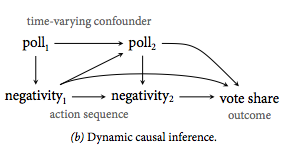A Framework for Dynamic Causal Inference in Political Science
American Journal of Political Science, Vol. 57, No. 2 (2013): 504-519
Dynamic strategies are an essential part of politics. In the context of campaigns, for example, candidates continuously recalibrate their campaign strategy in response to polls and opponent actions. Traditional causal inference methods, however, assume that these dynamic decisions are made all at once, an assumption that forces a choice between omitted variable bias and post-treatment bias. Thus, these kinds of “single-shot” causal inference methods are inappropriate for dynamic processes like campagins. I resolve this dilemma by adapting models from biostatistics to estimate the effectiveness of an inherently dynamic process: a candidate’s decision to “go negative.” Using data from U.S. Senate and Gubernatorial elections (2002-2006), I find, in contrast to previous literature and alternative methods, that negative advertising is an effective campaign strategy for Democratic non-incumbents. Democratic incumbents, on the other hand, are hurt by their negativity.